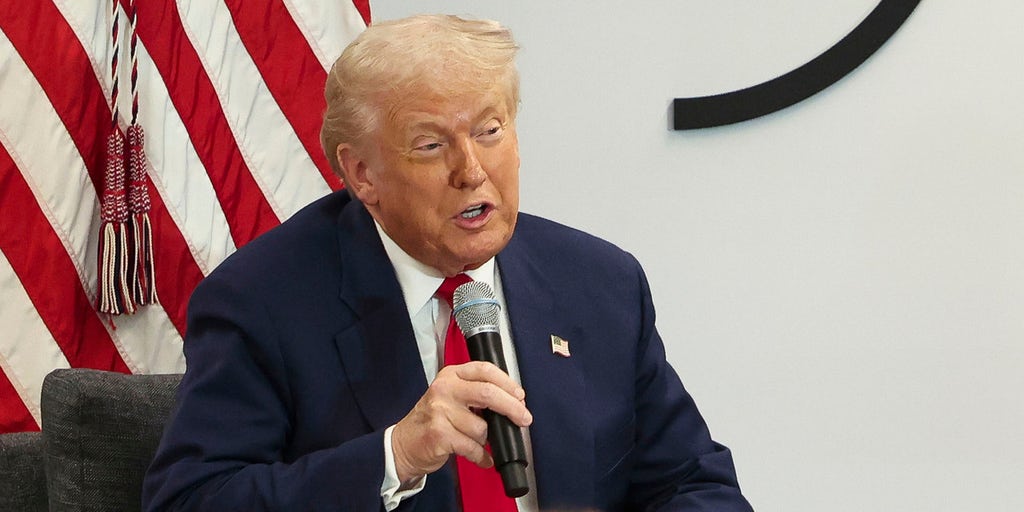Imagine the scene: President Trump sits across from the nation’s top CEOs and bank executives. The air is thick with anticipation. What unfolds in these meetings could shape the future of American business and finance. On today’s episode of ‘The Bottom Line’, hosts Dagen and David delve into these high-stakes discussions, revealing not just the business strategies at play but also the surprising accusations of bias against major banks like JP Morgan and Bank of America. Let’s unpack the drama and the implications of these pivotal meetings.
Trump’s Roundtable with Top CEOs and Bank Executives
The meeting between President Trump and the nation’s top CEOs and bank executives was not just another routine gathering. It was a strategic session aimed at understanding and influencing the direction of the American economy. Trump’s agenda was clear: to foster a business-friendly environment that encourages growth and innovation.
Key Players at the Table
Among the attendees were:
- Jamie Dimon, CEO of JP Morgan Chase
- Brian Moynihan, CEO of Bank of America
- David Solomon, CEO of Goldman Sachs
- Mary Barra, CEO of General Motors
These leaders represent some of the most influential companies in the United States. Their presence at the meeting underscored the significance of the discussions.
Agenda and Discussions
The agenda was packed with critical topics. Trump emphasized the need for deregulation to spur economic growth. He also discussed tax reforms and their potential impact on businesses. The executives, in turn, shared their concerns and expectations, creating a dynamic exchange of ideas.
However, the meeting was not without its tensions. Trump’s direct approach sometimes clashed with the more measured responses of the executives. This led to some heated moments, which Dagen and David analyzed in detail on ‘The Bottom Line’.
Accusations of Bias Against JP Morgan and Bank of America
In a surprising turn of events, President Trump accused JP Morgan and Bank of America of religious and political bias. These allegations sent shockwaves through the financial sector and raised questions about the relationship between big banks and the government.
Trump’s Specific Claims
Trump’s accusations were specific and pointed. He claimed that:
- JP Morgan was discriminating against conservative clients.
- Bank of America was refusing services to certain religious groups.
These claims, if true, could have significant legal and reputational repercussions for the banks involved. Dagen and David discussed the potential fallout and the banks’ responses to these serious allegations.
Bank Responses and Public Reaction
Both JP Morgan and Bank of America swiftly denied the accusations. They issued statements emphasizing their commitment to serving all customers fairly and without discrimination. However, the public reaction was mixed. Some supported Trump’s stance, while others questioned the validity of his claims.
The controversy also sparked a broader conversation about the role of banks in society and their responsibility to uphold ethical standards. This debate is likely to continue as more details emerge and investigations potentially unfold.
The Implications for American Business and Finance
The meetings and subsequent accusations have far-reaching implications for American business and finance. They highlight the delicate balance between government influence and corporate autonomy. They also raise questions about the future of regulatory policies and their impact on economic growth.
Economic Growth and Deregulation
Trump’s push for deregulation is a central theme in his economic strategy. He believes that reducing regulatory burdens will unleash the potential of American businesses. However, the CEOs at the meeting expressed mixed views. Some supported the idea, while others cautioned against the potential risks of unchecked deregulation.
The discussions also touched on tax reforms, another key aspect of Trump’s economic plan. The executives shared insights on how these reforms could affect their companies and the broader economy. Dagen and David provided a detailed analysis of these points, offering viewers a comprehensive understanding of the stakes involved.
The Role of Big Banks
The accusations against JP Morgan and Bank of America have put a spotlight on the role of big banks in society. These institutions play a crucial role in the economy, providing essential services to millions of customers. However, they also face scrutiny over their practices and ethical standards.
The controversy has reignited debates about the need for greater transparency and accountability in the banking sector. It also raises questions about the potential for political and religious biases to influence banking decisions. These issues are likely to remain at the forefront of public discourse as the situation develops.
The Future of Trump’s Economic Policies
As Trump continues to meet with business leaders and push his economic agenda, the future remains uncertain. His policies on deregulation and tax reform could have a significant impact on the economy. However, they also face opposition and challenges from various quarters.
Potential Challenges
One of the main challenges facing Trump’s economic policies is the political landscape. With a divided Congress, passing significant reforms can be difficult. Additionally, public opinion plays a crucial role in shaping policy outcomes. The controversy surrounding the accusations against JP Morgan and Bank of America could influence how the public views Trump’s economic agenda.
Another challenge is the global economic environment. The United States does not operate in a vacuum, and international factors can impact domestic policies. Trump’s approach to trade and international relations will also play a significant role in determining the success of his economic strategies.
Opportunities for Growth
Despite these challenges, there are also opportunities for growth. If Trump’s policies succeed in boosting economic activity, they could lead to increased investment and job creation. The meetings with top CEOs and bank executives are a crucial step in building support for these initiatives.
Moreover, the focus on deregulation and tax reform could attract more businesses to the United States, enhancing the country’s competitive edge. Dagen and David discussed these opportunities in detail, providing viewers with a balanced perspective on the potential outcomes.
Conclusion: Navigating the Complexities of Economic Policy
The meetings between President Trump and top CEOs and bank executives, along with the accusations of bias against JP Morgan and Bank of America, highlight the complexities of economic policy. These events are not just about business strategies or financial regulations; they are about the broader implications for American society and the global economy.
As we move forward, it will be essential to monitor how these developments unfold. The discussions on ‘The Bottom Line’ provide valuable insights into the dynamics at play, offering viewers a deeper understanding of the issues. Whether you support Trump’s economic policies or have concerns about them, one thing is clear: the future of American business and finance is at a critical juncture.
In conclusion, the meetings and accusations discussed on today’s episode of ‘The Bottom Line’ are more than just news stories. They are a reflection of the ongoing struggle to balance economic growth with ethical considerations. As we navigate these complexities, staying informed and engaged will be crucial for all of us.
Source: www.foxbusiness.com

